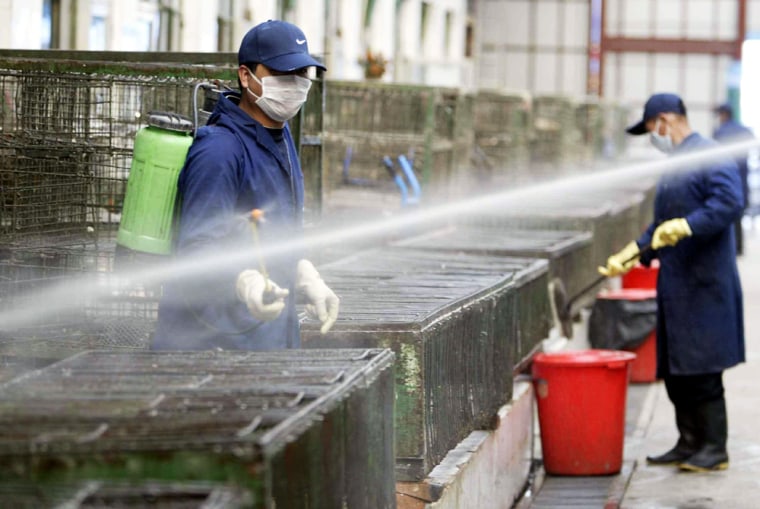Stepping up its fight against bird flu, China said Monday it has killed 6 million birds around its latest outbreak of the virus and ordered the immediate closure of all 168 live poultry markets in Beijing.
Meanwhile, investigations were continuing into whether three people — including a 12-year-old girl who died — were the nation’s first known human cases of the disease that has killed at least 62 people elsewhere in Asia since 2003.
In Liaoning province, east of Beijing, authorities have destroyed 6 million poultry in 15 villages near the site of an outbreak that killed 8,940 chickens, the Xinhua News Agency said.
The culling was unusually large by Chinese standards, but Xinhua said it was carried out because of rules requiring the destruction of all birds within two miles of an infection site.
Authorities closed all of Beijing’s 168 live poultry markets as a precaution against the possible spread of the virus in the Chinese capital, state television reported.
Victims lived near affected village
China has had no confirmed human infections from the virulent H5N1 strain of bird flu in its latest round of outbreaks. But it has imposed increasingly strict measures following warnings that a human case was inevitable if China can’t stop outbreaks among its 5.2 billion chickens, ducks and other poultry.
Experts are especially worried about China because of the vast scale of its poultry industry and because it is a major migration route for wild birds, which scientists say might spread the virus.
In Vietnam, the EU’s health commissioner conceded the European Union should have acted earlier to help Asian nations fight bird flu and pledged $35.7 million to help the region combat the virus.
“It’s better late than never,” Markos Kyprianou said during talks in Hanoi with Vietnamese Agriculture Minister Cao Duc PhatMarkos. “The EU is interested in cooperating with Asia to solve the problem.”
The three possible Chinese bird flu victims lived in or near Wantang village in the central Hunan province where the government says 545 chickens and ducks died of bird flu last month.
The girl, He Yin, who came into “close contact with sick birds,” died last month after developing a high fever, Xinhua said. Her 9-year-old brother was hospitalized with similar symptoms but recovered. The third suspected case was a 36-year-old middle school teacher who reportedly fell ill after chopping raw chicken while suffering from a minor injury to his hand, Xinhua said. He also was recovering.
Although all three earlier were cleared of having contracted the H5N1 strain of the bird flu virus, World Health Organization officials were running further tests.
Roy Wadia, a spokesman for WHO in Beijing, said it was not unusual for someone thought to be infected with a virus such as H5N1 to initially test negative but later test positive because blood samples taken shortly after exposure to the virus might not be conclusive as the body hasn’t had time to make enough antibodies. Final results could take weeks, he added.
Chinese authorities also put 192 people who had close contact with the three possible bird flu victims under medical observation, and one has acute bronchitis, the official China Daily newspaper reported Monday, citing the health ministry.
Planning next steps
The precautionary measures in Asia came ahead of the start of a three-day strategy meeting in Geneva where more than 300 scientists, public health experts, veterinarians and government officials are expected to share what they have learned and plan the next steps.
“While we cannot predict when or if the H5N1 virus might spark a pandemic, we cannot ignore the warning signs,” said Dr. Margaret Chan, the WHO’s top official in charge of monitoring bird flu. “For the first time in human history, we have a chance to prepare ourselves for a pandemic before it arrives.”
Currently, the virus is hard for humans to catch and most deaths have been linked to handling infected poultry, but health officials fear the virus could mutate and spark a human flu pandemic that could claim millions of lives.
